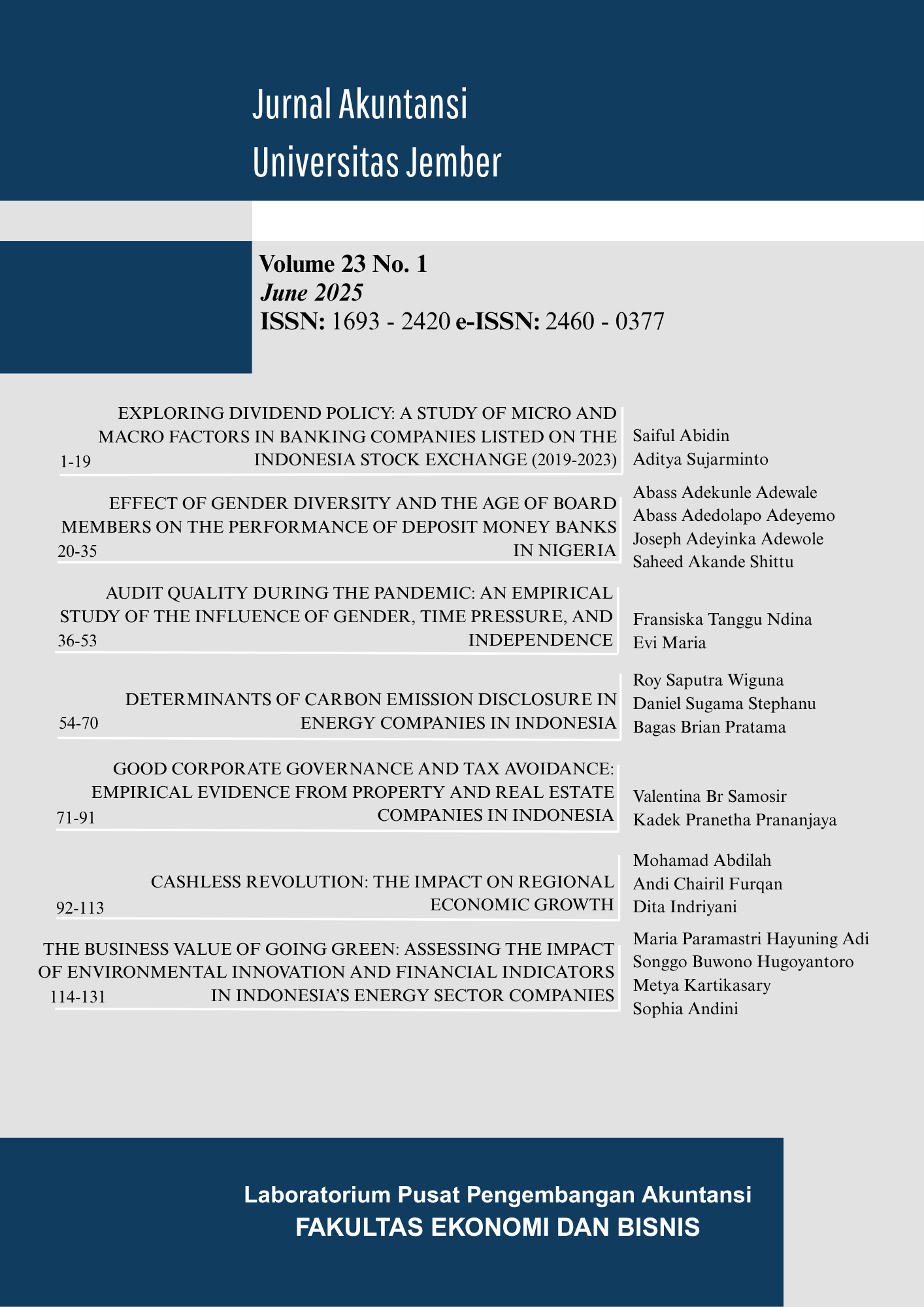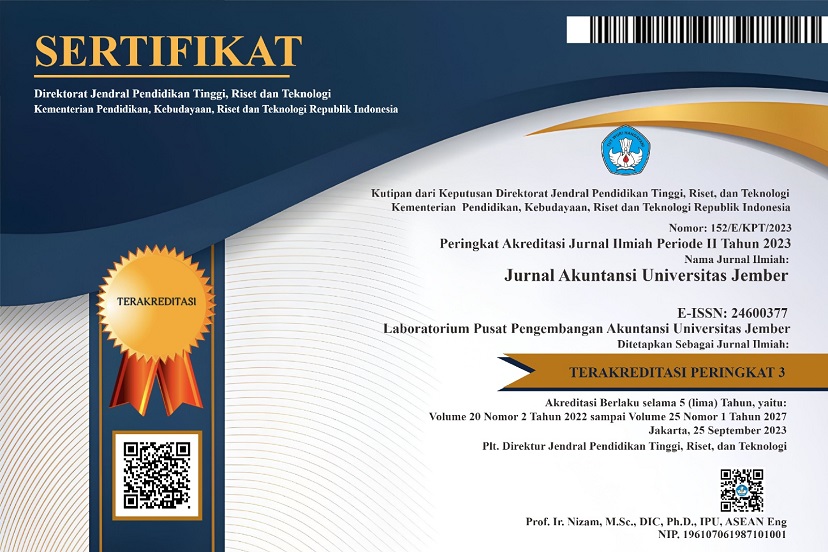THE BUSINESS VALUE OF GOING GREEN: ASSESSING THE IMPACT OF ENVIRONMENTAL INNOVATION AND FINANCIAL INDICATORS IN INDONESIA’S ENERGY SECTOR COMPANIES
DOI:
https://doi.org/10.19184/jauj.v23i1.53688Keywords:
Firm Value, Green process innovation, Green product innovation, Profitability, Corporate SustainabilityAbstract
ABSTRACT
This research aims to examine the effect of green innovation, profitability, and firm size on the firm value of Indonesian energy sector companies during the 2018–2023 period. The research is motivated by the growing importance of green innovation for encouraging environmental sustainability in energy sector companies. This research combine green innovation and financial indicators for increasing firm value. Using a sample of 66 data, the study employs panel regression analysis through Eviews software. The findings reveal that green product innovation have a significant positive impact on firm value. In contrast, green process innovation, profitability and firm size do not show a significant effect. The practical implications of this research related to the sustainability of energy sector companies are the importance of product innovation to optimize resources and minimize the negative impacts of carbon and pollution produced.
Keywords: Firm Value; Green process innovation; Green product innovation; Profitability; Corporate Sustainability
ABSTRAK
Penelitian ini bertujuan untuk mengetahui pengaruh green innovation, profitabilitas, dan ukuran perusahaan terhadap nilai perusahaan sektor energi yang terdaftar di Bursa Efek Indonesia (BEI) periode 2018-2023. Penelitian ini dilakukan karena adanya pentingnya inovasi hijau terhadap keberlanjutan bisnis perusahaan sektor energi di Indonesia. Penelitian ini menggabungkan inovasi hijau dan kinerja keuangan untuk meningkatkan nilai perusahaan sektor energi di Indonesia Dengan menggunakan 66 sampel data, penelitian ini menggunakan analisis regresi data panel dengan software Eviews. Hasil penelitian ini menunjukkan bahwa green product innovation berpengaruh positif terhadap nilai perusahaan. Green process innovation, profitabilitas dan ukuran perusahaan tidak berpengaruh terhadap nilai perusahaan. Implikasi praktis dari penelitian ini terkait dengan keberlanjutan perusahaan sektor energi adalah pentingnya inovasi produk untuk optimalisasi sumber daya dan meminimalkan dampak negatif dari carbon dan polusi yang dihasilkan.
Kata Kunci: Nilai Perusahaan; Inovasi Proses Hijau; Inovasi Produk Hijau; Profitabilitas; Keberlanjutan Perusahaan
Downloads
References
Amara, D. Ben, Qiao, J., & Zada, M. (2023). How to reconcile the climate change issue with economic growth? Spatial dual mediating effects of carbon emissions and foreign investment. Journal of Cleaner Production, 411, 137285. https://doi.org/10.1016/j.jclepro.2023.137285
Arpan, Y., & Carolina Odjan, M. A. (2020). Faktor Penentu yang Berdampak Terhadap Nilai Perusahaan: Studi Perusahaan Manufaktur di Bursa Efek Indonesia. ECo-Fin, 2(2), 81–91. https://doi.org/10.32877/ef.v2i2.318
Asni, N., & Agustia, D. (2022). The mediating role of financial performance in the relationship between green innovation and firm value: Evidence from ASEAN countries. European Journal of Innovation Management, 25(5), 1328–1347. https://doi.org/10.1108/EJIM-11-2020-0459
Bahar, H., & Lestari, E. (2023). Green innovation, financial performance, and firm value: A content analysis method. Journal of Business Research, 153, 113–128.
Bibi, Y. S., & Narsa, N. P. D. R. H. (2022). The impact of environmental management toward financial performance with green innovation as a mediating variable. Jurnal Akuntansi Universitas Jember, 20(2), 90–105. https://doi.org/10.19184/jauj.v20i2.34896
Chen, W.-J. (2022). Toward Sustainability: Dynamics of Total Carbon Dioxide Emissions, Aggregate Income, Non-Renewable Energy, and Renewable Power. Sustainability (Switzerland), 14(5). https://doi.org/10.3390/su14052712
Chen, Y., Tang, G., Jin, J., Li, J., & Paillé, P. (2022). Green process innovation and financial performance: The role of green social capital and customers’ tacit green needs. Journal of Innovation & Knowledge, 7(1), 100150. https://doi.org/10.1016/j.jik.2021.100150
Choiriyah, C., Fatimah, F., Agustina, S., & Ulfa, U. (2021). The Effect Of Return On Assets, Return On Equity, Net Profit Margin, Earning Per Share, And Operating Profit Margin On Stock Prices Of Banking Companies In Indonesia Stock Exchange. International Journal of Finance Research, 1(2), 103–123. https://doi.org/10.47747/ijfr.v1i2.280
Dorothy, P., & Endri, E. (2024). Environmental, social and governance disclosure and firm value in the energy sector: The moderating role of profitability. Problems and Perspectives in Management, 22(4), 588. http://dx.doi.org/10.21511/ppm.22(4).2024.44
Freeman, R. E. (1984). Strategic management: a stakeholder approach, Pitman. Boston, MA.
Garg, M., & Gupta, M. P. (2022). Impact of ESG performance on firm value and profitability: Evidence from global energy firms. Journal of Cleaner Production, 350, 131467. https://doi.org/10.1016/j.jclepro.2022.131467
Hasangapon, M., Iskandar, D., Purnama, E. D., & Tampubolon, L. D. (2021). The Effect Of Firm Size And Total Assets Turnover (Tato) On Firm Value Mediated By Profitability In Wholesale And Retail Sector Companies. Primanomics: Jurnal Ekonomi & Bisnis, 19(3), 49–63. https://doi.org/10.31253/pe.v19i3.635
Helmi, W. M., & Widiastuty, E. (2023). Effect of Green Innovation and Green Process Innovation on Firm Performance. Jurnal Riset Akuntansi Aksioma, 22(1), 55–69. https://doi.org/10.29303/aksioma.v22i1.203
Heriansyah, D. (2024). The Effect of Corporate Governance, Profitability, Liquidity, and Solvency on Corporate Social Responsibility (CSR) Disclosure: A Literature Review. Management Studies and Entrepreneurship Journal, 5(2), 5062–5080. http://journal.yrpipku.com/index.php/msej
Hirdinis, M. (2019). Capital structure and firm size on firm value moderated by profitability. International Journal of Economics and Business Administration, 7(1), 174–191. https://doi.org/10.35808/ijeba/204
Husna, A., & Satria, I. (2019). Effects of Return on Asset, Debt To Asset Ratio, Current Ratio, Firm Size, and Dividend Payout Ratio on Firm Value. International Journal of Economics and Financial Issues, 9(5), 50–54. https://doi.org/10.32479/ijefi.8595
Hussain, N., Rigoni, U., & Orij, R. P. (2018). Corporate governance and sustainability performance: Analysis of triple bottom line performance. Journal of Business Ethics, 149(2), 411–432. https://doi.org/10.1007/s10551-016-3099-5
Kartikasary, M., Paramastri Hayuning Adi, M., Marojahan Sitinjak, M., Hardiyansyah, & Yolanda Sari, D. (2023). Environmental, Social and Governance (ESG) Report Quality and Firm Value in Southeast Asia. E3S Web of Conferences, 426. https://doi.org/10.1051/e3sconf/202342602087
Khalil, M. A., Khalil, R., & Khalil, M. K. (2022). Environmental, social and governance (ESG)-augmented investments in innovation and firms’ value: a fixed-effects panel regression of Asian economies. China Finance Review International, ahead-of-print. https://doi.org/10.1108/CFRI-05-2022-0067
Khan, H. R., Usman, B., Zaman, K., Nassani, A. A., Haffar, M., & Muneer, G. (2022). The impact of carbon pricing, climate financing, and financial literacy on COVID-19 cases: go-for-green healthcare policies. Environmental Science and Pollution Research, 29(24), 35884–35896. https://doi.org/10.1007/s11356-022-18689-y
Khan, P. A., Johl, S. K., Kumar, A., & Luthra, S. (2023). Hope-hype of green innovation, corporate governance index, and impact on firm financial performance: a comparative study of Southeast Asian countries. Environmental Science and Pollution Research, 30(19), 55237–55254. https://doi.org/10.1007/s11356-023-26262-4
Kuo, T. C., Hong, I.-H., & Lin, S. C. (2016). Do carbon taxes work? Analysis of government policies and enterprise strategies in equilibrium. Journal of Cleaner Production, 139, 337–346. https://doi.org/10.1016/j.jclepro.2016.07.164
Lee, C. L., Ming, K. L. Y., & Yee, L. C. (2025). ESG: Its Threshold Effect on Asian Energy Company Profitability. International Journal of Energy Economics and Policy, 15(2), 692. https://doi.org/10.32479/ijeep.18430
Nguyen, T. T. H., & Song, W. (2021). Carbon Pricing and Income Inequality: An Empirical Investigation. Journal of Economic Development, 46(2), 155–182. https://www.scopus.com/inward/record.uri?eid=2-s2.0-85111545592&partnerID=40&md5=4a066497c13a27fb4828d15f2bc64ae1
Qing, L., Alnafrah, I., & Dagestani, A. A. (2024). Does green technology innovation benefit corporate financial performance? Investigating the moderating effect of media coverage. Corporate Social Responsibility and Environmental Management, 31(3), 1722–1740. https://doi.org/10.1002/csr.2659
Qiu, Y., Shaukat, A., & Tharyan, R. (2016). Environmental and social disclosures: Link with corporate financial performance. The British Accounting Review, 48(1), 102–116. https://doi.org/10.1016/j.bar.2014.10.007
Rahim, I. (2021). Environmental disclosure and firm efficiency: a study of Pakistani firms. Asian Review of Accounting. https://doi.org/10.1108/ARA-05-2019-0100
Spence, M. (1978). Job market signaling. In Uncertainty in economics (pp. 281–306). Elsevier. https://doi.org/10.1016/B978-0-12-214850-7.50025-5
Wang, D., & Wang, T. (2025). Does ESG Information Disclosure Improve Green Innovation in Manufacturing Enterprises? Sustainability, 17(6), 2413. https://doi.org/10.3390/su17062413
Wang, M., & Liu, Z. (2022). How do green innovation strategies contribute to firm performance under supply chain risk? Evidence from China’s manufacturing sector. Frontiers in Psychology, 13, 894766. https://doi.org/10.3389/fpsyg.2022.894766
Xie, X., Huo, J., & Zou, H. (2019). Green process innovation, green product innovation, and corporate financial performance: A content analysis method. Journal of Business Research, 101, 697–706. https://doi.org/https://doi.org/10.1016/j.jbusres.2019.01.010
Yi, Y., Zeng, S., Chen, H., & Shi, J. J. (2021). When does it pay to be good? A meta-analysis of the relationship between green innovation and financial performance. IEEE Transactions on Engineering Management, 9, 3260–3270.
Zhang, F., Qin, X., & Liu, L. (2020). The interaction effect between ESG and green innovation and its impact on firm value from the perspective of information disclosure. Sustainability, 12(5), 1866. https://doi.org/10.3390/su12051866
Zhang, Z. (2022). China’s carbon market: Development, evaluation, coordination of local and national carbon markets, and common prosperity. Journal of Climate Finance, 1, 100001. https://doi.org/10.1016/j.jclimf.2022.100001
Zhou, Y., Lv, S., Wang, J., Tong, J., & Fang, Z. (2022). The impact of green taxes on the carbon emission efficiency of China’s construction industry. Sustainability, 14(9), 5402. https://doi.org/10.3390/su14095402
Downloads
Published
Issue
Section
License
Copyright (c) 2025 JURNAL AKUNTANSI UNIVERSITAS JEMBER

This work is licensed under a Creative Commons Attribution-ShareAlike 4.0 International License.


















